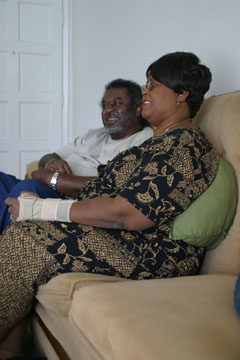 Curtis and Lula Weary moved into a Woodhaven apartment and like it, despite the city’s discouraging words.
Curtis and Lula Weary moved into a Woodhaven apartment and like it, despite the city’s discouraging words.
|
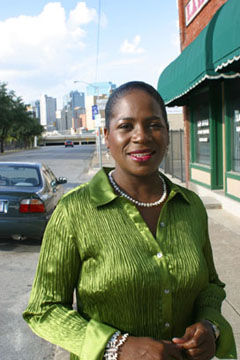 Edmonds: ‘There has to be a better way to guide them through the maze.’
Edmonds: ‘There has to be a better way to guide them through the maze.’
|
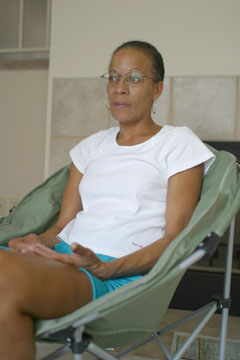 Farve: Getting booted from a local hotel ‘didn’t make sense.’
Farve: Getting booted from a local hotel ‘didn’t make sense.’
|
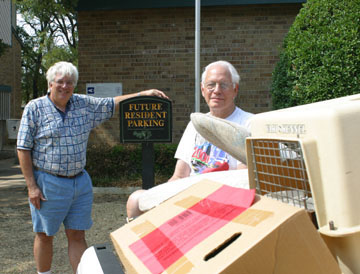 Pete Fletcher, left, and Norman Bermes believe the city won’t send Katrina refugees to Woodhaven because it interferes with their plan to get poor folks out of the neighborhood.
Pete Fletcher, left, and Norman Bermes believe the city won’t send Katrina refugees to Woodhaven because it interferes with their plan to get poor folks out of the neighborhood.
|
 Griffin: ‘The biggest problem these people have is that the goalposts get moved around on an almost-daily basis.’
Griffin: ‘The biggest problem these people have is that the goalposts get moved around on an almost-daily basis.’
|
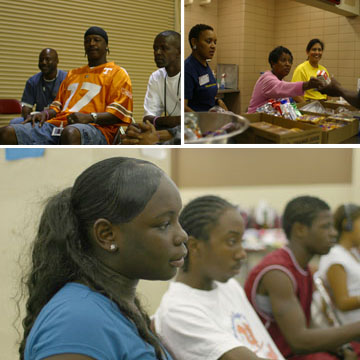 The shelter life: At the Will Rogers Center, top, Willie Hackett, Tracey Bonney, and John Bonney watch a football game. Center, Shirl Francis, Kathy Stephens, and Ruth Carr help hand out donated food. Bottom, Stephanie Royal, Mark Moran, and Jeremy Adams use some of the many computers available at the center.
The shelter life: At the Will Rogers Center, top, Willie Hackett, Tracey Bonney, and John Bonney watch a football game. Center, Shirl Francis, Kathy Stephens, and Ruth Carr help hand out donated food. Bottom, Stephanie Royal, Mark Moran, and Jeremy Adams use some of the many computers available at the center.
|
|
A D V E R T I S E M E N T
|
|
|
|
A D V E R T I S E M E N T
|
|
Apres Le Deluge
New Orleans evacutees are still adrift - this time in Texas’ leaky social services boat
By DAN MCGRAW
There are times when Barbara can’t help but think about her old life. She was born in St. Bernard Parish and lived there for more than 50 years, the last decade or so with her mom and her sister in the old family house. Everything was close: the Winn-Dixie where her daughter worked as a cashier just a few blocks away, buses running every few minutes to take her the five miles to downtown New Orleans if that’s where she was headed. Nice little restaurants and corner stores and neighbors she had known since she was a kid, all within shouting distance. More than just her home, the place helped define Barbara, gave her identity and memories and what she knew about life and happiness.
Her four sisters and two brothers all lived within a few minutes’ car ride, if you even bothered driving. Barbara hadn’t driven in years — didn’t need to, plus her diabetes and breathing troubles made her think getting behind the wheel wasn’t all that smart. Hell, even her 4-year-old grandson’s nursery school was just across the street from her daughter’s apartment, and Barbara would pick him up some days, when her daughter was working.
But then Katrina hit, and Barbara and her daughter and little grandson found themselves holding on for dear life to the roof of the two-story apartment building. Barbara had left her mom’s house to be with her daughter as they rode out the storm, but the roof eventually collapsed, water rose up to 20 feet high, and the family had to cling to furniture and roof beams to survive. Their rescuers arrived in a boat about four hours later, surprised that anyone had survived in the building at Paris Road and Genie Street. There’s nothing left of it now but mud and rubble.
And then came days and days of shelters — moving from the awful conditions inside the Superdome to air bases and eventually to Fort Worth. After weeks of cots and no privacy, Barbara (who asked that only her first name be used) wanted out of the shelters as quickly as possible. A church in Saginaw offered assistance, and Barbara and her family accepted, even though they didn’t even know where or what Saginaw was. Eventually the church helped them find a Section 8 apartment, a one-bedroom unit where her daughter and grandson sleep in the bedroom with Barbara on the sofa bed in the living room.
So this woman who spent her whole life in one place is now in a very different kind of place, and Saginaw is something of a shock for her. “I don’t want people to think we aren’t grateful for all the help,” Barbara said. “We aren’t familiar with Texas, and it’s not that we dislike it. I just feel that we’ve been dropped in the middle of nowhere, and it is very sad for us.”
Saginaw probably doesn’t use “middle of nowhere” as its slogan, but for an African-American woman used to New Orleans life, it might as well be. And Barbara’s experience is fairly typical for the evacuees who have flooded into Texas. Her major problems are that she is disabled (diabetes and breathing problems) and she has no car. So living in Saginaw, with no public transportation, makes the simple things in life she took for granted in Louisiana nearly impossible now. There’s no grocery store nearby. The healthcare she needs is in Fort Worth. Taking her grandson to the library to get some books is a mile-and-a-half walk — and no sidewalks either, so they trudge along beside a busy highway, past the grain elevators.
Volunteers have been helping Barbara with transportation, but that is dwindling as the days go by. “These people have jobs, and I realize they can’t come over here every day and give us the rides we need,” she continued. “But I feel like I’m now a shut-in. And I’ve never been a shut-in in my life. ... We just assumed people knew we needed a place that had some access to buses. And the worst thing is that the free rent everyone is talking about just isn’t happening for us.”
Barbara doesn’t qualify for the FEMA housing money because she gets a Social Security disability check. So she’s in Section 8 housing, where she pays $150 a month plus utilities for the apartment — not a lot, but then neither is her Social Security check, and by the time she pays for utilities, food, taxicab rides, and a few phone calls to the folks back home, there’s little left over. Her daughter would like to get back to work with Winn-Dixie, but the company pulled out of this region in the last few years.
So Barbara floats in nowhere land, not knowing how or when she’ll be able to return to her hometown, having no idea what the future might hold for her and her family. They’re all scattered: Mom and sisters and brothers are in Mississippi, six adults and a bunch of kids sharing a three- bedroom apartment, and other family members are in Florida. Barbara would like to join them, but there’s no room at that inn, and no housing nearby to rent, with so many people looking for places to ride out these nasty times.
It’s the same problem many of these new neighbors are dealing with in Tarrant County, plucked out of their homes and lives and dropped into some other reality, with little money, no transportation, a future full of holes.
In many ways, the federal, state, and local governments have responded with a generosity and diligence never before seen. One evacuee at the Will Rogers Memorial Center shelter called Fort Worth “the city of angels.” But the crisis is moving into a new phase: Evacuees are just about out of the shelters and into their new housing, and new lives are beginning.
Barbara’s story, unfortunately, is being repeated all over Fort Worth and Tarrant County; the outpouring of support from government, charities, churches, and individuals is slowing, and a different reality is starting to kick in. That first phase went well, for the most part, but there were enough hitches in the process that the whole post-hurricane effort was made even more painful. Many, like Barbara, are being placed in areas with no public transportation and no amenities within easy walking distance — despite the fact that the city turned down an offer of 100 apartment units, rent-free for three months to the evacuees, in an area where buses run right by the window. Apartment owners and others say local politics was at fault.
Federal aid from FEMA may last a year, but that estimate seems to change almost every day. Local charities say they are getting a lot of support, but many wonder if the end of that is near. They fear they may soon be having to stretch a pre-Katrina level of resources to cover both the evacuees and the charities’ regular needy clients. And those watchdog groups who monitor Texas’ social services and the situation for its poor — tattered and thin coverage under the best of circumstances — say these local problems are going to be played out across the state in coming months.
Local schools may be left with a big bill for New Orleans kids coming into their classrooms. Local tax dollars are also probably going to have to cover a lot of the healthcare for evacuees; that tab has already topped half a million dollars for the John Peter Smith public hospital system, with no answer yet as to how much of that will be repaid by Medicaid.
The sheer numbers of the evacuees mean the challenges will be great, and even the simplest of tasks, like getting people without cars into homes with grocery stores and life’s necessities nearby, is proving tough. Getting people into homes that remind them of their old neighborhoods — nearly impossible.
“People have been very helpful,” Barbara sighed. “But we don’t know what is going to happen to us. We’re just stuck.”
A few weeks ago, about a dozen evacuees, all black men, gathered outside of the 7-Eleven in the Cultural District trying to bum money for some smokes and beer. Other customers — mostly whites — were grumbling. They didn’t like being hit up for handouts by people they thought should be grateful for and content with the shelter and food they were already getting.
But it was hard to look at these guys and not put yourself in their spot — lifted out of their homes suddenly without money in their pockets, just trying to get a beer on a Saturday night. “I haven’t had a dime in my pockets for two weeks,” one guy lamented. “We’re all just going crazy in that shelter with nothing to do.” Then he asked the key question: “How would you handle it?”
And that is what is so hard about assessing this catastrophic event. No one imagined millions of people being forced out of their homes without so much as a suitcase, and no one in this part of the world — not governments or charities or churches — has much experience dealing with it. Maybe a beer and a smoke aren’t such unreasonable requests — and surely not so different from what a lot of FEMA officials, rescue workers, and harried Red Cross volunteers have turned to when contemplating the problems landed on them by Katrina.
For the most part, Fort Worth handled the shelter issue with positive results, though that varied from location to location. The Will Rogers Center, the central Fort Worth processing place for all evacuees, got good marks from evacuees.
“We were very lucky that we were brought to this shelter in Fort Worth,” said Carolyn Witherspoon, sitting outside Will Rogers with some friends and enjoying the cooler weather. “These people have been great to us. We call this the ‘city of angels.’” Home calls to her, she said, “but we are going to need to wait until New Orleans gets back to a level that is livable. Right now there is no police protection, no stores open, no schools for kids. So we have to wait and see what will happen.”
In other shelters there have been some problems. Eddie Griffin, a civil rights activist and church pastor, has been working with evacuees at shelters on the East Side. “The biggest problem for these people is that the goalposts get moved around on an almost-daily basis,” he said. “New volunteers come from the Red Cross, and they aren’t updated on how policies have changed from the previous workers. It’s amazing to see, but sometimes the Red Cross people have been the least informed.”
The Worth Heights shelter at Echo Lake Park had the worst problems, Griffin said. Food was often cold, volunteer turnover was high, and institutional knowledge nonexistent. “New volunteers have no idea what has been done before them. Old forms and dead-end processes have stayed in place,” he said.
Julius Williams, 51, a disabled evacuee who suffers from convulsions if he doesn’t get his meds, said the experience at Worth Heights has been difficult. “It’s hard to believe that the government is paying for this shit we are living in,” Williams said. “I don’t have a car, and I just figured that this city had decent public transportation all over the place. We’re finding out now that it doesn’t, but the housing people don’t seem to think it’s important.”
Griffin said conditions have been better at the Resource Connection on the city’s southeast side. Security, medical assistance, processing resources, and morale were all a notch above some other shelters. But still, he said, the shelter’s isolation, in the middle of a park, with few amenities within walking distance, was a problem. The T provided bus service, but the evacuees didn’t know where to go. Even washing clothes was tough — shelter residents had to arrange for rides to a laundromat.
Others say some of the shelters were highly dysfunctional on many levels. Stacy Mims is a Southlake stay-at-home mom who volunteered almost immediately to help out. “What has happened in these shelters is basically a lockdown for poor people needing help,” she said. Mims stopped working at the Resource Connection shelter after about a week, saying that the Red Cross was turning away needed volunteers there and that the shelters were being hurt by bureaucratic power struggles.
Mims said evacuees started telling her what they needed. The two items most requested, she said, were an odd but not unexpected combination — Bibles and cigarettes. “After the third or fourth day I worked at the Resource Connection, a lot of the women told us they wanted Bibles,” she said. “So I called a sheriff’s chaplain I knew and got two boxes of Bibles. I started handing them out and was stopped by the Red Cross volunteer. ‘You can’t do that,’ she yelled at me. She said we would have to start handing out Bibles for Jewish people and the Koran and stuff for all the other religions. I told them we should do that, too. But they didn’t want that either. So I hid them in a closet and had a stash of Bibles I had to sneak out to these people.
“I also found out that so many of these people smoked, and this was just such a stressful time of their life,” Mims continued. Denying cigarettes to regular smokers, she said, was “asking them to come off of a drug they need. I saw people chewing their fingers off from being nervous. So I bought cartons [of cigarettes] and passed them out like candy.
“Who are we to judge?” Mims asked. “The Red Cross was determining what is acceptable behavior. The American people believe the Red Cross is going around hugging people, but they are just giving them the bare necessities and not allowing people to really help. They told me what I was doing was unacceptable behavior. It made me sick.”
Even something as simple as hair care became an issue, according to Kim Young, an elementary school teacher who also does African-American hair styling. Young said she organized eight beauticians to help cut and style hair for the evacuees at the Resource Connection. The evacuees were appreciative, she said, but Red Cross officials moved the beauticians all over the building and finally kicked them out.
“The Red Cross people decided they were in charge and told us we would have to shut down and leave,” Young said. “They actually told us that cutting hair violated fire codes, but it seemed like it was making excuses to have us leave. I really don’t know why helping people with hair care made them mad at us.”
A spokeswoman for the Tarrant County Red Cross would not comment on the individual complaints. “Red Cross has been doing its best to help people in a very difficult situation,” she said.
It is not surprising that there have been people and needs falling through the cracks — especially considering the bureaucracy involved in getting what help is available. Fort Worth attorney Bobbie Edmonds is offering free legal help to Katrina evacuees and says there are big problems that need to be addressed. “These FEMA applications can be very complicated, and a lot of individuals can’t read or write and can’t understand the technical stuff in the applications,” Edmonds said. “I think the people helping these folks really need to take care to make sure it is all explained right. Some people are not getting what they need, and there has to be a better way to guide them through the maze.”
Denise Farve, an international shipping worker for 19 years in New Orleans, found herself at the Amerisuites Hotel in Grand Prairie. The Red Cross had guaranteed the hotel room for a full month on Sept. 19. Two days later, Farve said, she was booted out by the hotel staff who called the police.
Farve said she believes that the hotel wanted her out because they could get a higher room rate from some Hurricane Rita evacuees from Galveston. “I had my own FEMA number, but it all didn’t make sense,” said Farve, who is African-American and felt that racial discrimination was part of the equation. “The thing that puzzles me was that they called the police even though I had four more weeks from the Red Cross. No one would answer my questions. It was like ‘OK, black bitch, get out.’”
A manager for the Amerisuites Hotel would not comment on Farve’s complaint but said “there was more involved in this than she is telling you.” He referred all question to the Grand Prairie Police Department, where officials said they had no record of the event, as no charges were ever filed.
But Farve’s suspicion of discrimination is a common one among evacuees. Whether the complaints stem from the slow government response to an emergency involving a large group of poor black people or the prevailing thought among many black New Orleans residents that the government secretly blew up the levees to save white neighborhoods, one cannot just push the racial angle to the side. And in Fort Worth, where city officials are working hard to get evacuees into new housing, the race angle is once again front and center.
Archie Sutton was disappointed. He’d been staying at the Will Rogers Center, and city officials had told them that all the evacuees there would be moved into more permanent housing by the end of last week. But now the news was that they’d have to wait another week. “The way we have been treated here has been great, but the major problem we have been dealing with is that the decision-makers in Fort Worth housing have been fumbling the ball on this one,” Sutton said.
Sutton’s stories echo those of other evacuees. He has horror stories from the Superdome (he watched a man slip and fall to his death from an upper walkway) and wound up in Fort Worth without knowing he was coming here. He owns his own truck washing business in Louisiana but has no home to return to.
“Fort Worth has instructed us to fill out paperwork to place us in housing,” Sutton said. “But I can see the Fort Worth housing people have frowns on their faces. They want to move us on, but it keeps getting delayed.”
The city has available apartments and houses to put people in, but red tape seems to be bogging down the process. Fort Worth has set aside $3 million for housing costs and will be reimbursed by FEMA for up to six months of rentals. In effect, Fort Worth is choosing the units people are moving into. Participating apartment owners are required to sign contracts with the city, units have to be inspected and meet certain requirements.
Assistant City Manager Libby Watson, who is coordinating the city’s evacuee aid effort, defended the housing decisions. “All of the contracts we have entered into have proximity to a bus line. We are working with The T to make sure these people have access to public transportation,” she said. One of the goals has been to find apartment complexes with more than one unit available but also to scatter the evacuees throughout the community. The city has been arranging housing for about 3,000 people, she said, and the Red Cross and federal officials have found homes for others.
Michael Gange, assistant director of the city’s Environmental Management Department, said that the city is also trying to relocate people like Barbara, who may have found themselves moved to areas where the buses don’t run. “There have been some issues where faith-based people have taken people in areas without public transportation, and the city and county are now trying to address that,” he said.
That all seems reasonable — until what some see as racial politics is added to the regular bureaucratic mix. A few days after the storm, three apartment complexes on Boca Raton Boulevard in Woodhaven offered the city 100 units rent-free for three months for evacuees. Local residents and charities were rounding up furniture, and utilities would also be free during those months. The owners of the three complexes — Oak Hollow, Cherry Hill, and Villa Del Rio — didn’t even want FEMA money for the three months. The offer was a free gift of apartments that could house about 500 people.
There was a major problem, however. These are the same apartments that the city filed nuisance abatements against last year, claiming they should be torn down, allegedly because of high crime rates there. The apartment owners have fought the city, and some have charged that the city — specifically Fort Worth City Council member Becky Haskin — is singling out these apartments because homeowners in Woodhaven want the largely black, mostly poor renters out.
“A few days after the shelters started filling up, we wrote them saying we were setting up a program to serve this need,” said Dallas attorney Kenneth Chaiken, who represents the apartment owners. “We had the resources of available apartments and had area churches willing to raise money for furniture and food, etc. The owners of those three apartments reached out with absolutely three months of free rent. We didn’t hear from the city, so we contacted them again. At that point [Assistant City Attorney] Tom Patterson called me and said the city is not interested in helping out there.”
Chaiken said the city is using the Katrina victims as a way to try to put the apartments out of business. “There is a reason why they are not routing Katrina victims into the perfectly fine units,” Chaiken said. “They don’t want these apartments filling up. They have engaged in a campaign to make the apartments suffer economically through the loss of tenants.”
The apartment owners filed suit in state court two weeks ago against Haskin, the city, and Woodhaven Community Development, claiming the defendants have “affirmatively steered prospective residents of the apartments away from the apartments, including evacuees of the recent hurricane tragedy, who the plaintiffs invited to reside in their properties on very attractive terms that would assist them in rebuilding their lives.”
Chaiken said the city and the apartment owners had struck a deal earlier this year by which owners agreed that all new residents of the three complexes would be subjected to rigorous background checks. The apartment owners had asked the city to relax some of those background checks for the Katrina victims, noting that comprehensive background checks take time. City officials refused.
Neither Haskin nor Patterson returned calls seeking comment for this story. Watson said the city’s decision was the right one. “Those three apartment complexes in question were not operating in a manner that we want to have in our community,” the assistant city manager said. “We are not going to place folks in an apartment complex that we don’t feel meets a minimal standard.”
Norm Bermes and Pete Fletcher are Woodhaven community activists who’ve been fighting the city’s nuisance designation for the apartments. They had worked to get furnishings for apartments for the Katrina evacuees and set up a job counseling service in the neighborhood. The rejection of their efforts left them angry.
“My understanding is that the powers that be want lower-income folks out of Woodhaven” Fletcher said. “In order to do that [Haskin] needs to take down apartments. If the apartments were to have a positive effect here, then it would be tougher to get rid of them. The positive press does not serve that master very well.”
Chaiken said some believe the city was spreading rumors to evacuees that Woodhaven was a bad neighborhood they should avoid. Four shelters residents interviewed for this story said they had been told just that by Fort Worth housing counselors.
But some evacuees are moving in there regardless, taking the offer of three months’ free rent, and knowing that the FEMA money won’t be coming after that. Those new Woodhaven residents feel the apartments and neighborhood are just fine. “We haven’t had any problems at all. It’s a very nice apartment and seems like a good neighborhood,” said Lula Weary, who now lives in Oak Hollow with her husband. “Oh, we saw a few baby cockroaches, but we got rid of them right away. But the apartment is good for us, so much better than the shelter, and everyone is helping us out.”
One of the reasons the Wearys like Woodhaven is the access to public transportation. Right outside of their apartment, they can catch buses that run to grocery stores, a Wal-Mart on Eastchase Parkway, downtown, and a Trinity Railway Express stop for those who need to get to Dallas. Those with children like the fact that school buses also stop right in front of the apartments.
The Rev. Art Ezell, pastor of the Bethlehem Baptist Church, said he’s been getting the runaround from the city as he tries to help evacuees move into Woodhaven apartments. “They should be working to remove as many barriers as possible to get these people settled, but I think they have other issues here that are keeping these people from getting their lives back in order,” he said.
“One of the reasons we selected that area for housing was the bus system over in Woodhaven,” Ezell continued. “You have people here who have lost their homes, and if they had a car, they lost that too. The only way they can get jobs is to live on a transit line. If you put people in areas where there are no bus lines, then how will they get to their jobs?
“We have to put people in places where they can get their lives back in order, and mass transit is a part of that,” he said. “If we don’t do that, we are automatically setting these people up to go back in the system where they are just going to be poor and unfortunate. ... At some point in time, we’ll have to allow people to fend for themselves. They need the necessary things to live a life that has some type of respect.”
Even good numbers on how many Katrina evacuees are in Tarrant County are hard to come by, much less reliable estimates of what the costs for the aid effort will be. Some figures are starting to come in — and they are sobering.
Watson said 9,000 heads of households have registered with FEMA in Tarrant County, so the total number of individuals needing assistance here could be as high as 30,000. The Congressional Budget Office last week estimated that 373,000 evacuees had found shelter in Texas. The immediate federal costs from Katrina relief stand at $100 billion, but another $30 billion or more will be budgeted in 2006. On a national level, when it’s all said and done, paying for Katrina will have about the same effect on the federal budget and deficit picture as funding another war.
For Texas schools, the bill may be an additional $450 million — and about $6.2 million for the Fort Worth district alone for the estimated 1,000 evacuee students attending classes here. FEMA has said it will reimburse districts for things like transportation costs, computers, and mental health counselors, but not for additional teachers.
Since most of the evacuees have no other source for healthcare — and tend to include more elderly and disabled persons than the general population — public hospitals like John Peter Smith will have to cover more services with local tax dollars. JPS Health Network spokesperson Drenda Witt said the hospital has thus far treated about 1,100 Katrina evacuees at a cost of about $450,000 for inpatient and outpatient care and $95,000 in drug bills. Witt said JPS will probably get some Medicaid reimbursement for that — but no one knows how much.
Charities are also looking at the calendar, their supplies, and their bank balances with some concern. “Local agencies are going to be stressed to serve these people,” said Nancy O’Malley, a spokeswoman for the United Way of Metropolitan Tarrant County.
Andrea Helms, communications director for the Tarrant County Area Food Bank, agreed that times might get tough after the holidays. The food bank distributes 1.2 million pounds of food for 290 agencies each month in normal times, but the evacuees may need an additional 500,000 pounds. “Right now we really don’t know how much we will need, but we know transportation is going to be a big issue,” Helms said. “We distribute food to agency by zip code, but people have to come in and get it. We are going to have to figure out how to get people the food they need, because most don’t have the transportation.”
Watson acknowledged the complexity of the problems facing the Fort Worth area. “We are worried on a couple of different levels,” she said. “We have to continue to have a high level of support for these people, but we are not without our own problems. We have people who are homeless and have needed support long before Katrina. We have kids with no healthcare. We now have 15 committees, with representatives from charities and government on them, and if there is a silver lining to all this, maybe we are figuring out ways to work better together and benefit our communities better in the long run.”
Anne Dunkelberg, assistant director for the Austin-based Center for Public Policy Priorities, thinks the heaviest burden posed by the evacuees will be in healthcare. “In the short term, we have some substantial federal commitment to pay for the healthcare services for the low-income evacuees,” Dunkelberg said. “But there are going to be limits on this. During the first five months, the churches and local government and food pantries and schools are going to be getting a check from the feds. The real question will come after five months are up and whether the state will have to absorb the costs.
“The problem we are going to have is who is staying,” she said. “Louisiana homeowners may have more of a feeling of community that draws them back. But someone who lived in abject poverty will have weaker ties and are the more likely to stay. And that is the problem the state will be having. These people are not going to be treated like they are from Louisiana forever. And when that stops, these people will get treated like the rest of the poor people here. And that has never been very good.”
In Texas, Medicaid “doesn’t cover many low-income parents anyway,” Dunkelberg said. “Our safety net is no better than the ones in Louisiana or Mississippi. But this hurricane peeled back the truth about poverty, and it will continue to do that in Texas. In the near term, we will get a good amount of federal support. But after that, the Medicaid program might not take care of things. And then the costs will be absorbed by the local hospitals, and that could cost taxpayers a lot.”
Back in Saginaw, Barbara isn’t worried about being homeless — she is just worried about how to get back home. And she’s also wondering how to get to the library to get some books for her grandson.
“It’s all money, money, money right now,” she said. “It’s strange how times change. When that storm hit, we were worried about whether we were going to live. Then we were just so worried in the Superdome. It was unspeakable and unlivable for human beings. The bathrooms were overflowed, and the stench was just so horrible. There were dogs running around loose in this horrible place. It was just pathetic. No place to sleep, no place to bathe.
“So when we got out, we were just so grateful,” she continued. “But now the reality has set in. I don’t know what we are going to do. My daughter needs to work, but how is she going to get there? We need to get more paperwork from the Red Cross and FEMA, but we need to arrange a ride for everything. My grandson needs to have a stable home life.”
“The people have been wonderful to us. We have been helped greatly, and we are grateful. But this isn’t home. It just isn’t home.”
You can reach Dan McGraw at dan.mcgraw@fwweekly.com.
 Email this Article...
Email this Article...

